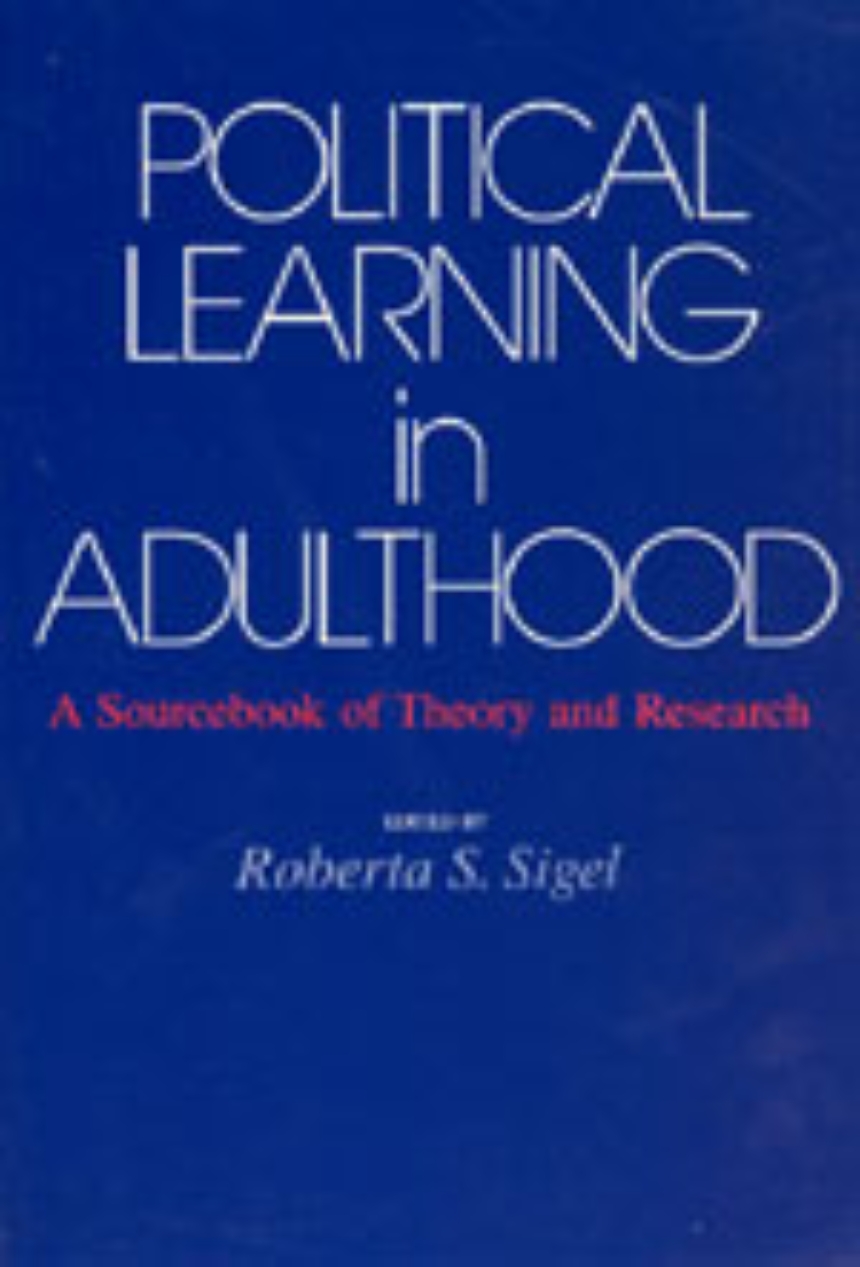Political Learning in Adulthood
A Sourcebook of Theory and Research
In the wake of World War II, the issues of political stability in general and the survival of stable democracies in particular captured the attention of American political scientists. An inevitable offshoot of this interest was the study of political behavior—how it is acquired and how and why it persists. In its early stages, work on political socialization focused exclusively on childhood and adolescence, as if the learning process ends when adulthood begins. Only recently has adult socialization emerged as a legitimate field of study within political science.
In Political Learning in Adulthood, social scientists for the first time examine the changes in political outlook and behavior that take place during the adult years, providing an invaluable overview of the problems, theories, and methodological approaches that characterize the field of political socialization. They consider which political values remain constant and which are subject to change, and they explore the ways in which both ordinary and extraordinary life events affect adults’ political worldviews. Among specific topics considered are the effects of age and aging, the relation between participation in the work force and the development and expression of political views, continuity and change in the wake of revolutionary social and political movements, and the effects of such traumatic and life-threatening situations as war and terrorist activity.
In Political Learning in Adulthood, social scientists for the first time examine the changes in political outlook and behavior that take place during the adult years, providing an invaluable overview of the problems, theories, and methodological approaches that characterize the field of political socialization. They consider which political values remain constant and which are subject to change, and they explore the ways in which both ordinary and extraordinary life events affect adults’ political worldviews. Among specific topics considered are the effects of age and aging, the relation between participation in the work force and the development and expression of political views, continuity and change in the wake of revolutionary social and political movements, and the effects of such traumatic and life-threatening situations as war and terrorist activity.
500 pages | 6.00 x 9.00 | © 1989
Political Science: Political Behavior and Public Opinion
Psychology: Social Psychology
Sociology: Individual, State and Society
Table of Contents
Introduction: Persistence and Change
Roberta S. Sigel
Part I
Introduction: Age and Political Socialization
1. Age and History: Generations and Sociopolitical Change
Michael X. Delli Carpini
2. Aging and Adult Political Socialization: The Importance of Roles and Role Transitions
Janie S. Steckenrider and Neal E. Cutler
Part II
Introduction: The World of Work
3. Work as a Source of Political Learning Among Wage-Laborers and Lower-Level Employees
William M. Lafferty
4. Political Socialization in Social Welfare Work
Paula Dressel and Michael Lipsky
5. Military Service and Political Socialization
John P. Lovell and Judith Hicks Stiehm
6. Psychological Perspectives on Theories of Adult Development and the Political Socialization of Leaders
Stanley Renshon
Part III
Introduction: Social Movements and Immigration
7. The Civil Rights Movement and Black Political Socialization
Aldon D. Morris, Shirley J. Hatchett, and Ronald E. Brown
8. Gender Politics and the Socializing Impact of the Women’s Movement
Susan J. Carroll
Part IV
Introduction: Coping with Traumatic Events
10. The Texture of Terrorism: Socialization, Routinization, and Integration
Irving Louis Horowitz
11. The Aftermath of War: Adult Socialization and Political Development
Robert S. Laufer
Conclusion: Adult Political Learning—A Lifelong Process
Roberta S. Sigel
List of Contributors
Index
Roberta S. Sigel
Part I
Introduction: Age and Political Socialization
1. Age and History: Generations and Sociopolitical Change
Michael X. Delli Carpini
2. Aging and Adult Political Socialization: The Importance of Roles and Role Transitions
Janie S. Steckenrider and Neal E. Cutler
Part II
Introduction: The World of Work
3. Work as a Source of Political Learning Among Wage-Laborers and Lower-Level Employees
William M. Lafferty
4. Political Socialization in Social Welfare Work
Paula Dressel and Michael Lipsky
5. Military Service and Political Socialization
John P. Lovell and Judith Hicks Stiehm
6. Psychological Perspectives on Theories of Adult Development and the Political Socialization of Leaders
Stanley Renshon
Part III
Introduction: Social Movements and Immigration
7. The Civil Rights Movement and Black Political Socialization
Aldon D. Morris, Shirley J. Hatchett, and Ronald E. Brown
8. Gender Politics and the Socializing Impact of the Women’s Movement
Susan J. Carroll
Part IV
Introduction: Coping with Traumatic Events
10. The Texture of Terrorism: Socialization, Routinization, and Integration
Irving Louis Horowitz
11. The Aftermath of War: Adult Socialization and Political Development
Robert S. Laufer
Conclusion: Adult Political Learning—A Lifelong Process
Roberta S. Sigel
List of Contributors
Index
